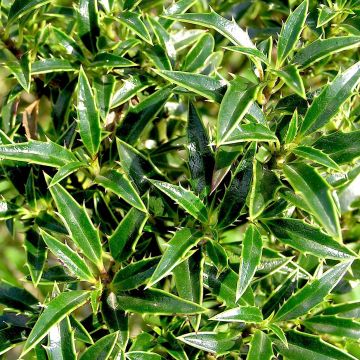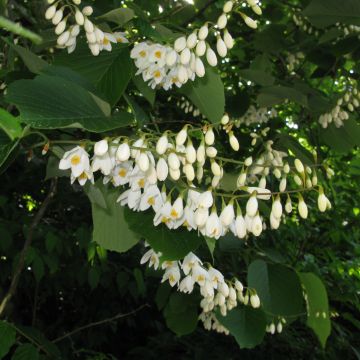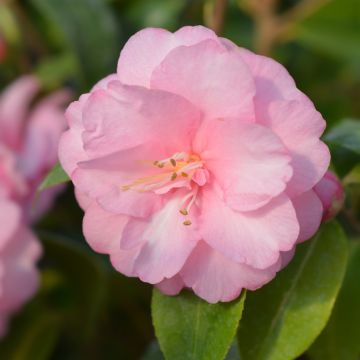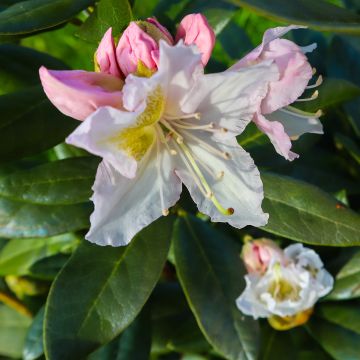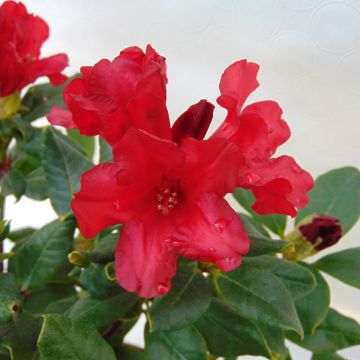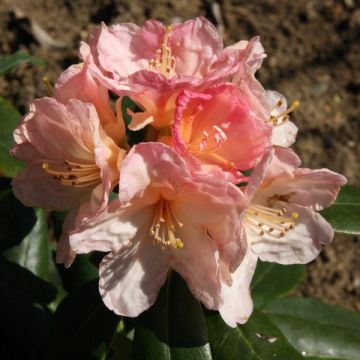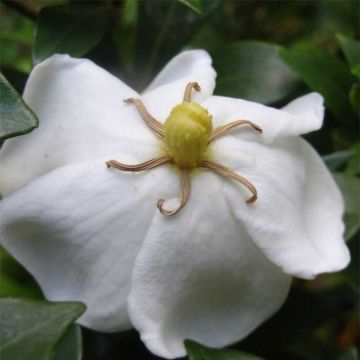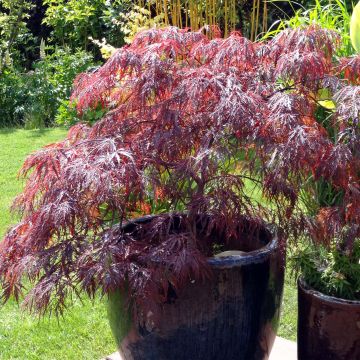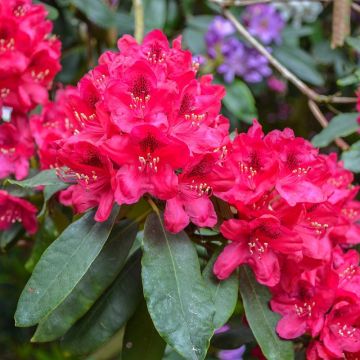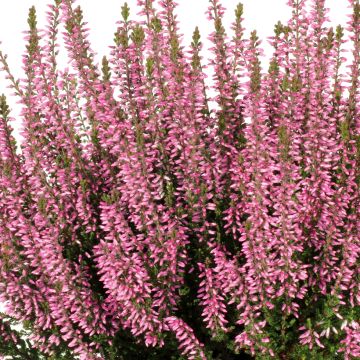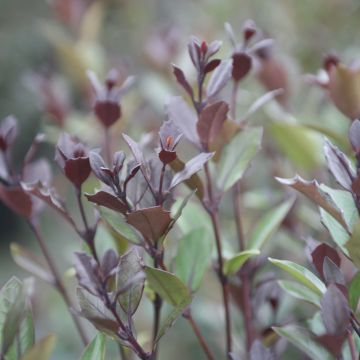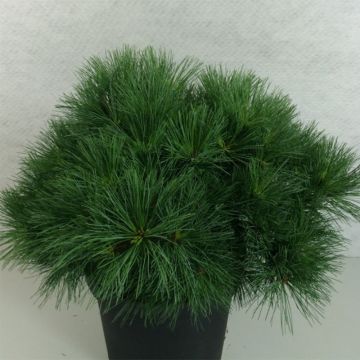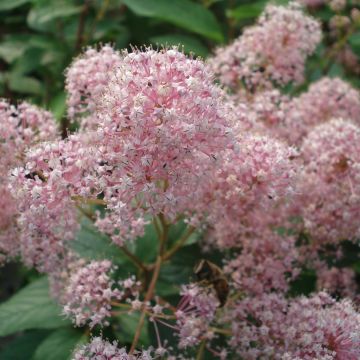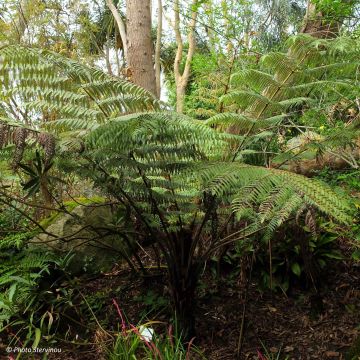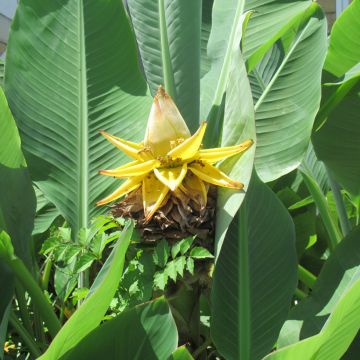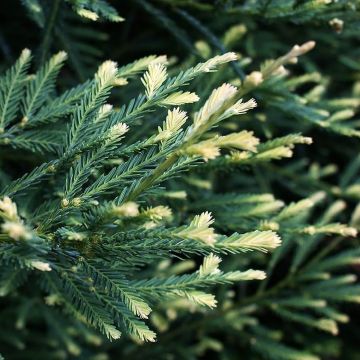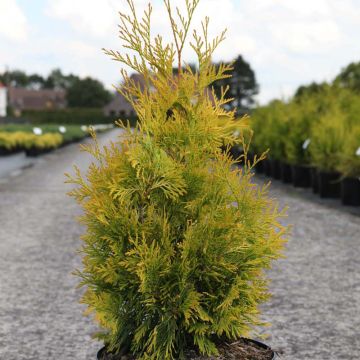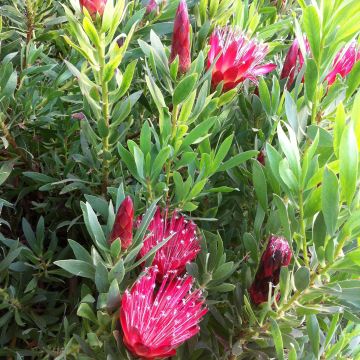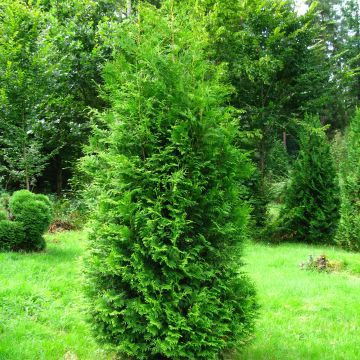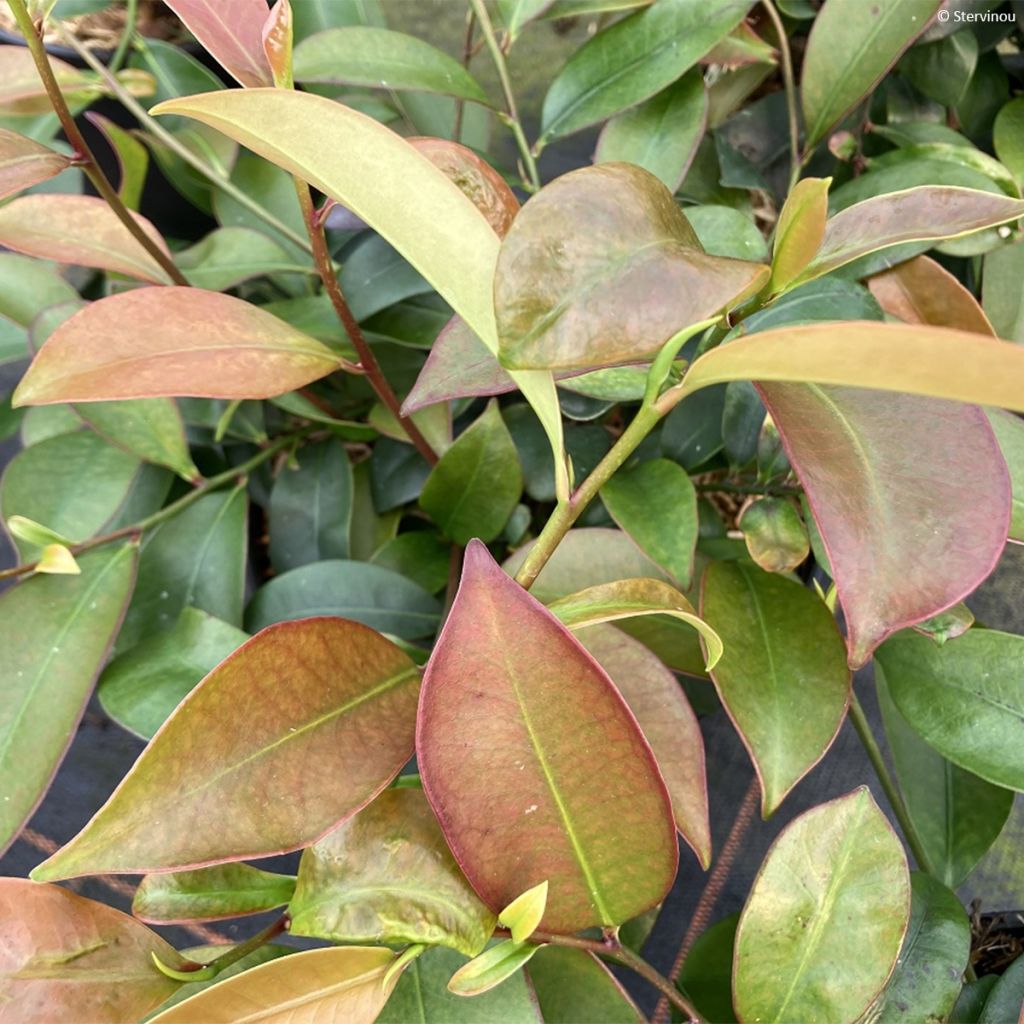

Cleyera japonica - Cleyera du Japon
Cleyera japonica
Cleyera japonica
Japanese Cleyera, Sakaki
This item cannot be shipped to the selected country
Delivery charge from €5.90
More information
Schedule delivery date,
and select date in basket
This plant carries a 24 months recovery warranty
More information
We guarantee the quality of our plants for a full growing cycle, and will replace at our expense any plant that fails to recover under normal climatic and planting conditions.
From €5.90 for pickup delivery and €6.90 for home delivery
Express home delivery from €8.90.
Does this plant fit my garden?
Set up your Plantfit profile →
Description
Cleyera japonica, locally nicknamed Sakaki, is an evergreen bush introduced from warm regions of Asia relatively rarely planted in gardens. This cousin of camellias, a sacred tree in the ancient Shinto religion, is more commonly grown in a conservatory due to its reputation as a frost-sensitive plant. From an aesthetic point of view, this cleyera is interesting for its decorative foliage, fragrant flowering, and red fruit turning black in autumn. When planted in the ground, it looks impressive, but its limits in terms of frost resistance and tolerance to summer drought remain to be tested. To give it the best chance, plant it in a very sheltered spot, in rich and loose soil, preferably cool and slightly acidic rather than too chalky.
Cleyera japonica belongs to the pentaphyllaceae or tea family according to classifications. In nature, it is found in oak forests in the warm regions of Japan, South Korea, and mainland China. It grows on the slopes of mountains or in valleys, up to 2000 m (6561 ft 8 in) in altitude. It is a bush with an erect and bushy habit, with numerous branches arranged in a characteristic manner, almost horizontal, covered with dense and evergreen foliage in winter. The leaves measure up to 9 cm long. They are oblong, thick, dark green, tinged with coppery pink on new shoots in spring. Shiny, they can also take on reddish tones in winter. In June-July, depending on the climate, it bears pendulous cream-white cup-shaped flowers on one-year-old branches measuring 2 cm (0.8 in) in diameter with 5 petals, difficult to spot at first glance, but fragrant. They are followed in autumn by small red fruits that turn black when ripe, quite discreet and resembling cherries, but not edible. The bark is smooth and dark reddish-brown in colour.
Slow-growing, the Cleyera japonica reaches about 1.50 m (4 ft 11 in) in height, and up to 2.50 m (8 ft 2 in) in favourable conditions at maturity. Plants grown in pots indoors rarely exceed 60-75 cm (23.6-29.5 in) in height and sometimes produce small fragrant white flowers. This bush appreciates soils rich in organic matter as well as semi-shaded to sunny locations. Very decorative and compact, this bush is ideal for adding colour to a well-sheltered courtyard, such as terraces and small urban gardens. It is resistant to pollution and suitable for container planting. It can be planted with other acid-loving plants, such as Japanese azaleas and rhododendrons, camellias, kalmias, magnolias, Japanese andromedas (Pieris), heathers, or even sacred bamboos. Also consider hydrangeas to give it a flowering companion in summer!
Report an error about the product description
Cleyera japonica in pictures
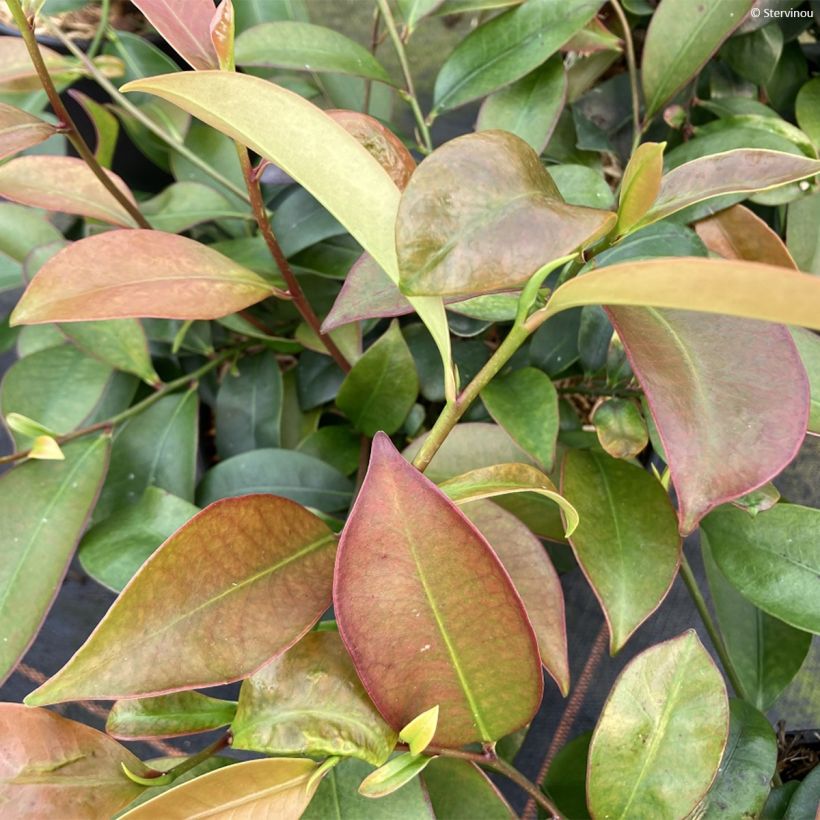

Plant habit
Flowering
Foliage
Botanical data
Cleyera
japonica
Pentaphylacaceae (Theaceae)
Japanese Cleyera, Sakaki
Southeast Asia
Other Ericaceous Shrubs
Planting and care
To grow Cleyera japonica successfully, pick a spot that gets sun or partial shade and is protected from cold and drying winds. The soil should be light, humus-rich, and preferably acidic or neutral. Avoid heavy soils, waterlogged areas in winter, and arid soils. Regular watering is vital, especially during the first two years of cultivation, particularly in dry conditions. Once established, this plant can tolerate dry summers better. Mulch the base to keep the soil fresh.
To plant, dig a hole three times bigger than the pot. Soak the root ball in water, and plant the bush in a mixture of 1/4 leaf compost, gravel or pumice, and loam. Water thoroughly and keep the soil moist in the summer. To maintain, remove dead branches and shorten those that become too large.
Planting period
Intended location
Care
This item has not been reviewed yet - be the first to leave a review about it.
Evergreen shrubs
Haven't found what you were looking for?
Hardiness is the lowest winter temperature a plant can endure without suffering serious damage or even dying. However, hardiness is affected by location (a sheltered area, such as a patio), protection (winter cover) and soil type (hardiness is improved by well-drained soil).

Photo Sharing Terms & Conditions
In order to encourage gardeners to interact and share their experiences, Promesse de fleurs offers various media enabling content to be uploaded onto its Site - in particular via the ‘Photo sharing’ module.
The User agrees to refrain from:
- Posting any content that is illegal, prejudicial, insulting, racist, inciteful to hatred, revisionist, contrary to public decency, that infringes on privacy or on the privacy rights of third parties, in particular the publicity rights of persons and goods, intellectual property rights, or the right to privacy.
- Submitting content on behalf of a third party;
- Impersonate the identity of a third party and/or publish any personal information about a third party;
In general, the User undertakes to refrain from any unethical behaviour.
All Content (in particular text, comments, files, images, photos, videos, creative works, etc.), which may be subject to property or intellectual property rights, image or other private rights, shall remain the property of the User, subject to the limited rights granted by the terms of the licence granted by Promesse de fleurs as stated below. Users are at liberty to publish or not to publish such Content on the Site, notably via the ‘Photo Sharing’ facility, and accept that this Content shall be made public and freely accessible, notably on the Internet.
Users further acknowledge, undertake to have ,and guarantee that they hold all necessary rights and permissions to publish such material on the Site, in particular with regard to the legislation in force pertaining to any privacy, property, intellectual property, image, or contractual rights, or rights of any other nature. By publishing such Content on the Site, Users acknowledge accepting full liability as publishers of the Content within the meaning of the law, and grant Promesse de fleurs, free of charge, an inclusive, worldwide licence for the said Content for the entire duration of its publication, including all reproduction, representation, up/downloading, displaying, performing, transmission, and storage rights.
Users also grant permission for their name to be linked to the Content and accept that this link may not always be made available.
By engaging in posting material, Users consent to their Content becoming automatically accessible on the Internet, in particular on other sites and/or blogs and/or web pages of the Promesse de fleurs site, including in particular social pages and the Promesse de fleurs catalogue.
Users may secure the removal of entrusted content free of charge by issuing a simple request via our contact form.
The flowering period indicated on our website applies to countries and regions located in USDA zone 8 (France, the United Kingdom, Ireland, the Netherlands, etc.)
It will vary according to where you live:
- In zones 9 to 10 (Italy, Spain, Greece, etc.), flowering will occur about 2 to 4 weeks earlier.
- In zones 6 to 7 (Germany, Poland, Slovenia, and lower mountainous regions), flowering will be delayed by 2 to 3 weeks.
- In zone 5 (Central Europe, Scandinavia), blooming will be delayed by 3 to 5 weeks.
In temperate climates, pruning of spring-flowering shrubs (forsythia, spireas, etc.) should be done just after flowering.
Pruning of summer-flowering shrubs (Indian Lilac, Perovskia, etc.) can be done in winter or spring.
In cold regions as well as with frost-sensitive plants, avoid pruning too early when severe frosts may still occur.
The planting period indicated on our website applies to countries and regions located in USDA zone 8 (France, United Kingdom, Ireland, Netherlands).
It will vary according to where you live:
- In Mediterranean zones (Marseille, Madrid, Milan, etc.), autumn and winter are the best planting periods.
- In continental zones (Strasbourg, Munich, Vienna, etc.), delay planting by 2 to 3 weeks in spring and bring it forward by 2 to 4 weeks in autumn.
- In mountainous regions (the Alps, Pyrenees, Carpathians, etc.), it is best to plant in late spring (May-June) or late summer (August-September).
The harvesting period indicated on our website applies to countries and regions in USDA zone 8 (France, England, Ireland, the Netherlands).
In colder areas (Scandinavia, Poland, Austria...) fruit and vegetable harvests are likely to be delayed by 3-4 weeks.
In warmer areas (Italy, Spain, Greece, etc.), harvesting will probably take place earlier, depending on weather conditions.
The sowing periods indicated on our website apply to countries and regions within USDA Zone 8 (France, UK, Ireland, Netherlands).
In colder areas (Scandinavia, Poland, Austria...), delay any outdoor sowing by 3-4 weeks, or sow under glass.
In warmer climes (Italy, Spain, Greece, etc.), bring outdoor sowing forward by a few weeks.

































